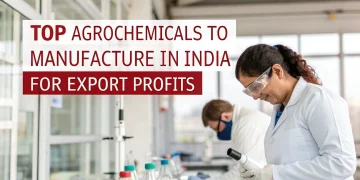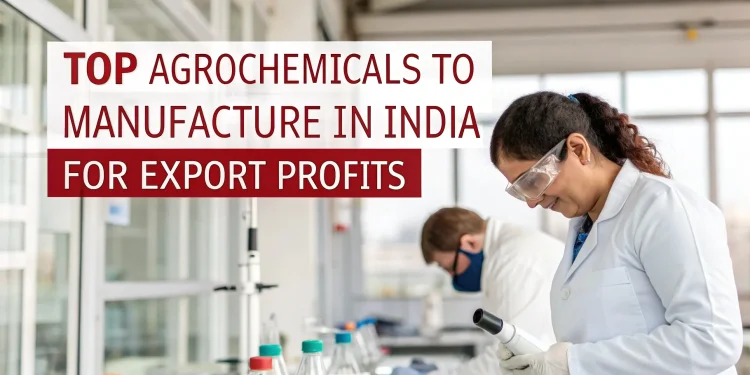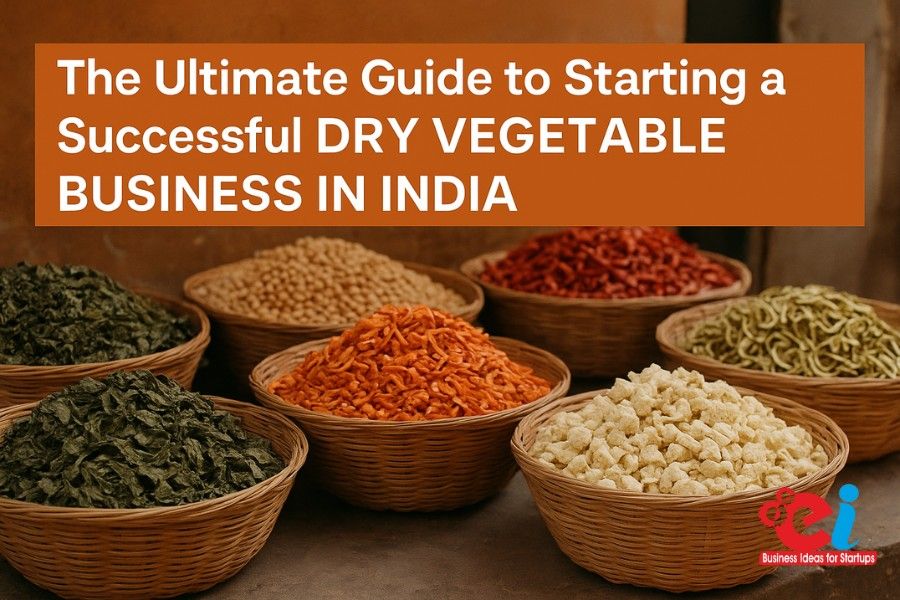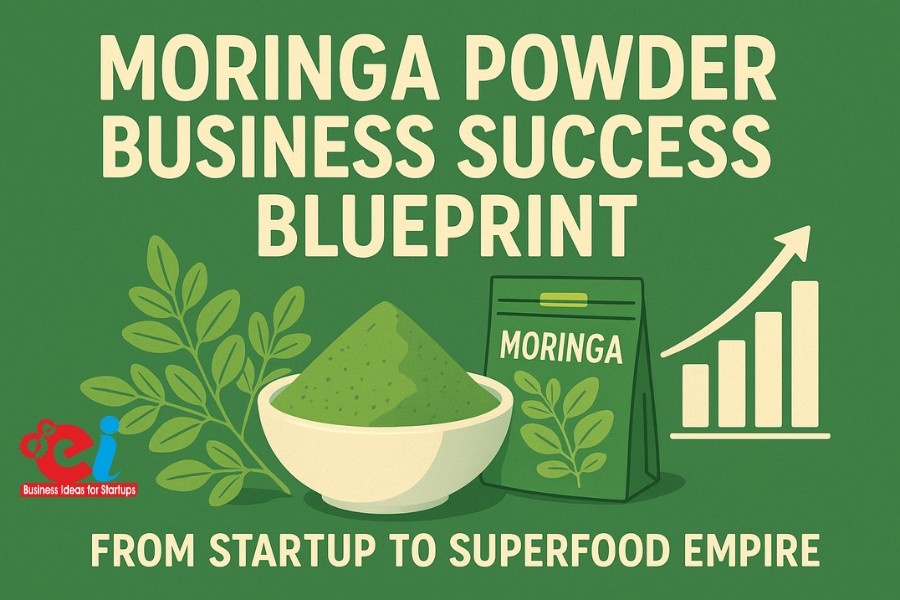India is witnessing changes in its agriculture sector. The agrochemical industry stands at the core of these changes due to the increased need for fuel security and sustainable farming, alongside an ever-growing supply of more than 140 million hectares of farmlands. Agrochemicals serve an indispensable function to modern agriculture by safeguarding and augmenting productivity through pesticides, herbicides, fungicides, and fertilizers. With such a critical business impact, launching an agrochemical manufacturing unit is incredibly valuable for new startups or entrepreneurs.
The Growth Story of Agrochemicals in India
India currently ranks as the fourth-largest producer of agrochemicals worldwide. The domestic market has been growing at a CAGR of 8-10% due to rising awareness amongst farmers, government initiatives towards achieving greater yields, and the presence of foreign companies. In 2024, estimates valued the Indian agrochemicals market at $5 billion with expectations that it will surpass $8 billion by 2028.
India holds another significant advantage as a net exporter for agrochemicals; countries from Latin America, Southeast Asia, and Africa are increasingly purchasing raw materials along with intermediate-grade and technical-grade pesticides manufactured in India. This simultaneous availability adds to both local and international demand making agrochemicals a strong industrial segment.
Types of Agrochemicals that Are Currently Most Popular
Insecticides and herbicides are in highest demand on an international scale, which means entrepreneurs have an opportunity to innovate within these markets. Insecticides like chlorpyrifos, imidacloprid, and lambda-cyhalothrin are extremely popular for use on cotton, rice, and pulses. Due to a labor shortage in farming, there is also a high demand for glyphosate herbicide as well as pendimethalin and atrazine.
There are also gaps in the fungicide market such as carbendazim and azoxystrobin mancozeb which can be used on fruits. The plant growth regulator market has room for expansion too by micronutrients catering toward high-value crops. There are more opportunities to develop agrochemical intermediates for products like 2,4-D acid and technical-grade triazoles.
Now Is the Right Time
Indigenous agrochemical production is being encouraged through government initiatives like Atmanirbhar Bharat or PLI schemes. Offering greater educational availability related to pest control is driving domestic demand while exports of Indian technical-grade agrochemicals continue to keep growing making them accepted internationally.
Global buyers seeking to diversify from Chinese suppliers are turning towards India due to the China Plus One strategy along with technology access through toll manufacturing allowing simpler entry into the market further strengthens this opportunity.
Related: How to Start an Agrochemicals Manufacturing Business?
How to Set Up an Agrochemical Manufacturing Unit
An agrochemical plant is an investment that encompasses both technology and legal regulations. Following are standard procedures:
1. Market Research and Feasibility Study
Conduct a comprehensive market study prior to any investment. Look for target crops, regional demand, competition, and untapped agrochemicals markets. You’ll also need to analyze trends in active ingredients and newer formulations along with market gaps. Entrepreneurs can turn to NPCS as they specialize in compiling Market Survey cum Detailed Techno Economic Feasibility Reports which help businesses make informed decisions.
2. Site Selection
The guidelines set forth indicate permission-granting zones like chemical or industrial estates as optimal locations. You will still need 2–5 acres of land so consider state approved areas first, prioritizing the ones with power/water supply accessibility as well transport infrastructure for raw materials and finished goods.
3. Technology Incorporation
Specific chemical processes are determined by your focus crop (technical grade or formulations). Chlorination, nitration, esterification, and neutralization are some common ones yours might include. In-house R&D is possible assuming you possess the necessary capabilities but if not finding custom synthesis partners from global firms or signing technology transfer agreements would work too.
4. Plant Layout and Required Machinery
The required machinery for this process includes reactors, blenders, centrifuges, distillation columns, scrubbers, pulverizers and packaging lines. Following the design layout for your plant will optimize material workflow and help meet control of pollution standards.
NPCS reports provide tailoring layout planning alongside a listed set of machineries relevant to plant output and product line.
5. Sourcing Raw Materials
Primary raw materials including solvents, toluene, xylene and phosphorus compounds are acquired from chemical markets in Gujarat and Maharashtra. It is important on this stage to establish good partnerships with consistent suppliers while investigating alternatives for imports if necessary.
6. Compliance With Regulations
This part of the document includes policies you need following prior approvals:
- Central Insecticides Board & Registration Committee (CIBRC)
- Pollution Control Board (state and central)
- Hazardous Waste Disposal Compliance
- Fire Safety and Factory License
Acquiring licenses can take anywhere between 6 to 12 months. It’s crucial to engage environmental consulting firms along with legal advisors at the start of your entrepreneurship journey.
7. Staffing Requirements and Specialist Skills Needed
Recruit educated professionals such as chemists, process engineers along with environment health safety officers (EHS). Fill experienced slots available in QA/QC through Marketing Packaging Logistics funnels too concerning good manufacturing practices training sessions aligned with industry standards.
8. Branding, Distribution, and Marketing
Marketing in the agrochemical sector is mostly B2B. Collaborating with agri-input dealers, FPOs, and regional distributors still remains a primary focus for business development. Startups can also harness new digital channels to inform and connect with farmers directly.
ChemExpo India and AgroWorld are great opportunities to showcase products to both domestic and international buyers.
Financial Overview of a Medium-Scale Agrochemical Plant
Project Type: Technical Grade + Formulations
Capacity: 3,000 TPA
Estimated Investment: ₹18–₹25 Crores
Expected EBITDA Margin: 20–25%
Payback Period: 3–4 years
Profitability hinges on achieving sufficient throughput, effective raw material cost strategies, strong international sales relationships, and solid linkages. NPCS feasibility reports also provide detailed financial forecasts.
Related: Top 20 Chemical Manufacturing Ideas for Startups
Sustainability and Green Chemistry Focus
As environmental concerns increase, green chemistry becomes increasingly important. Minimizing these factors gives emerging startup companies a greater competitive advantage.
- Reduce use of solvents
- Reduce effluent load
- Use bio-based ingredients or biodegradable
- Recycle process water
International clients increasingly demand cleaner production practices which aids their entry into global supply chains.
Looking Ahead: Anticipated Trends & Innovations Related to Sustainability
- Biopesticides: Increased consumption of residue-free produce drives the proliferation of biopesticide usage.
- Nano Formulations: More effective absorption in smaller doses.
- AI & IoT in Farming: Smart crop advisory combined with targeted crop protection offers exciting opportunities for agrochemical startups
- Contract Manufacturing: Indian units are emerging as global CMOs for agrochemical giants.
- Combination Products: Combo herbicides and fungicides are gaining popularity due to their ease of use.
Conclusion
The visionaries eager to embrace the science-sustainability-business trifecta have a uniquely rich opportunity in building an agrochemical unit India. Domestically, the demand is high while globally there is a shift in sourcing along with favorable policies providing a welcoming environment for entrepreneurs looking to build niche, scalable businesses. Success lies in market intelligence coupled with technical planning and compliance adroit marketing strategy.
Fulfilling these components requires precision from industry specialists like NPCS, who prepare comprehensive reports detailing processes such as manufacturing steps, required raw materials, designing plant layouts alongside costs which helps ensure smoother launches.


























